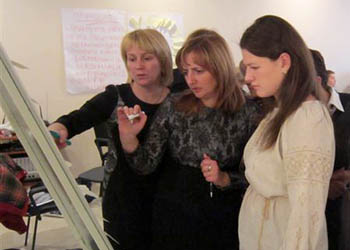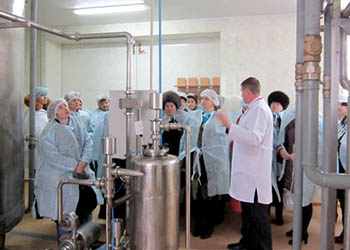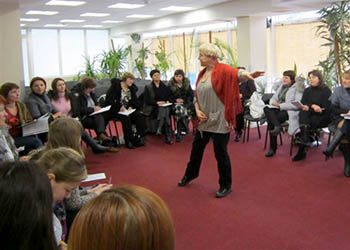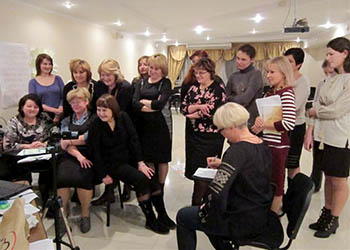
Story and Photos courtesy of Heifer Ukraine
Parliamentary hearing organizers proposed that Heifer Ukraine participants conduct a series of trainings in four regions of Ukraine to identify problems and develop an action plan to better serve rural women. The Women's Information Consultative Center provided funding for study tours between October 2012 and February 2013, which included four two-day trainings and brought together more than 120 women from 13 agricultural service cooperatives.
During the October 2012 parliamentary committee hearings, Iryna Pavliuk, a board member from Storozhynets raion cooperative union, said, "The world is changing. Rural communities have to search for new ways to reach sustainability; new trainings and educational programs are required; and all these issues become even more important for rural women."
 Professional journalists, who also participated, provided media coverage. The trainings were supported by printed and electronic analytical and statistical information and other materials and included the following topics: leadership fundamentals, project planning and development, self-presentation skills, audit of women's safety and other gender initiatives in the villages, combating gender violence, development of entrepreneurship and cooperation skills, participation in the decision-making process, and organizational and economic management skills.
Professional journalists, who also participated, provided media coverage. The trainings were supported by printed and electronic analytical and statistical information and other materials and included the following topics: leadership fundamentals, project planning and development, self-presentation skills, audit of women's safety and other gender initiatives in the villages, combating gender violence, development of entrepreneurship and cooperation skills, participation in the decision-making process, and organizational and economic management skills.
The study tour confirmed that women from all areas of Ukraine share common problems, including a high unemployment rate; lack of infrastructure, recreation places, and medical and obstetric centers; a high level of intensive manual labor; low prices for agricultural produce; and hidden domestic violence.
 Practical educational visits to successful households led by rural women were an important part of the training. In November 2012, participants from the Highlands region traveled to Spas village to visit a tea production mini-plant of the Chysta Flora co-op, headed by Halyna Stovpyuk. Women make up 96 percent of the workers in the village, which is located in Kolomyia raion, Ivano-Frankivsk oblast. While there, the visitors learned about the village's local school and sports complex. Special attention was given to green tourism, which is a primary occupation for women of the Ukraine's Highlands region.
Practical educational visits to successful households led by rural women were an important part of the training. In November 2012, participants from the Highlands region traveled to Spas village to visit a tea production mini-plant of the Chysta Flora co-op, headed by Halyna Stovpyuk. Women make up 96 percent of the workers in the village, which is located in Kolomyia raion, Ivano-Frankivsk oblast. While there, the visitors learned about the village's local school and sports complex. Special attention was given to green tourism, which is a primary occupation for women of the Ukraine's Highlands region.
In December 2012, women from the country's western region visited Molochnyi Krai, a milk-processing plant in Panka village, Storozhynets raion, Chernivtsi oblast, where they learned about dairy product production. Most of the plant's employees are women who, thanks to community involvement and participation in Heifer Ukraine's projects, received jobs and were able to stay in their village to provide their children with the best education available in the oblast. Participants found the following topics of particular interest: formation of agricultural cooperative unions, experience exchange, and attraction of state and donor funds.
Women leaders from the eastern region shared their experiences on the development of mini-dairy family farms, following the example of the Dobrobut Andriivky co-op in Luhansk, Dnipropetrovsk and Donetsk oblasts. Co-op leader Antonina Kurylenko told about the replacement of manual milking by milking machines as well as about new approaches to mini-farms construction process. Training participants visited a center for youth development and recreation in the town of Raihorodok and learned about Raihorodets co-op activities in the Donetsk oblast.
 The southern region group focused on establishing cooperation with state authorities and government programs establishing milk-processing facilities.
The southern region group focused on establishing cooperation with state authorities and government programs establishing milk-processing facilities.
Women from villages of Odessa oblast met for training in February 2013. Most of the participants were members of raion councils and state administration employees, who are potential partners for new projects.
During the training, participants developed their own projects and had a chance to receive mini-grants. Such cooperation gives women leaders the opportunity to improve their qualifications, identify problem-solving strategies, develop their skills in entrepreneurship and cooperation, and create an all-Ukraine network of mutual support for rural women.
According to participants, each of the study visits confirmed that Heifer Ukraine's work helps improve community life significantly and, therefore, improves lives of rural women. For women in villages, who rarely have an opportunity to leave their households, it was important to have these positive experiences of housekeeping and farming. Their poverty mentality was replaced by an active position and determination in solving problems.